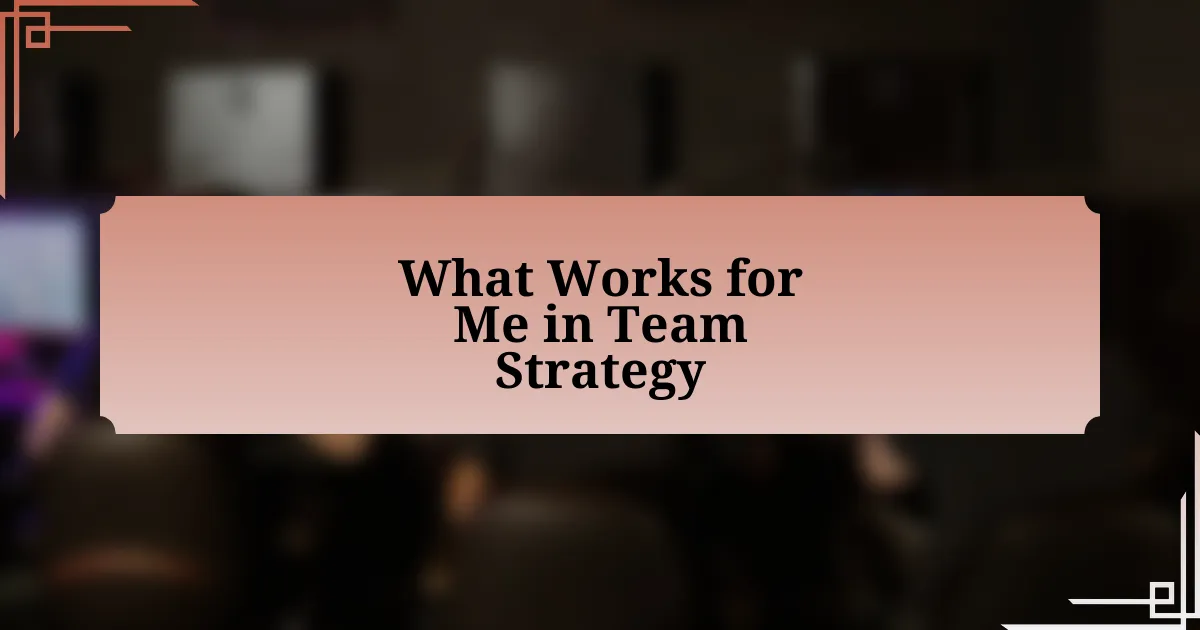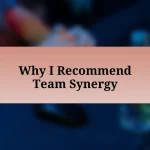Key takeaways:
- Team strategy in eSports relies on clear communication, defined roles, and adaptability to enhance performance.
- Effective communication is crucial; it fosters trust and resilience, turning challenges into opportunities.
- Structured practice routines, including reflection and specific drills, improve individual skills and team synergy.
- Building strong relationships and embracing constructive feedback are key to enhancing team dynamics and overall success.
Author: Evelyn Hartley
Bio: Evelyn Hartley is an award-winning author known for her compelling narratives and richly drawn characters. With a background in psychology and literature, she weaves intricate tales that explore the complexities of human relationships and the intricacies of the human psyche. Her debut novel, “Whispers in the Dark,” was celebrated by critics and readers alike, earning her a dedicated following. Evelyn’s work has been featured in various literary journals and anthologies, and she frequently speaks at writing conferences and workshops. When she’s not writing, she enjoys hiking in the mountains and volunteering at her local animal shelter. She resides in Seattle with her two rescue dogs, Luna and Milo.
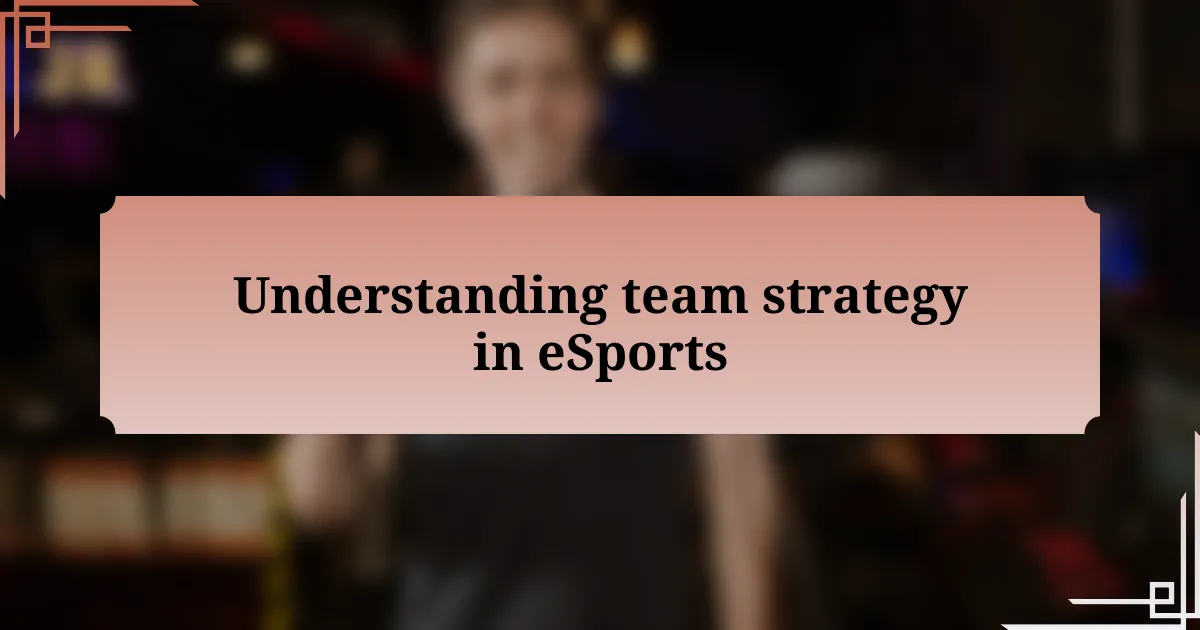
Understanding team strategy in eSports
Understanding team strategy in eSports is crucial for success. From my experience, an effective team strategy hinges on clear communication and defined roles. Have you ever noticed how some teams seem to flow effortlessly while others struggle? That difference often comes down to how well players understand their individual responsibilities within the larger team dynamic.
I remember a match where we didn’t have a solid plan. It felt chaotic, and without a shared understanding of our strategy, we faltered in the face of the opposing team’s execution. Having a designated shot-caller who can make split-second decisions can often change the tide of the game. It’s not just about individual skill; it’s about leveraging each player’s strengths to create a cohesive unit that can adapt and respond to in-game challenges.
Moreover, strategies should evolve based on team synergy and meta shifts. I’ve seen teams who stick rigidly to a plan even when it’s clear it’s not working. Wouldn’t it be more effective to assess and adjust in real-time? Emphasizing flexibility fosters a culture where learning from defeats becomes as valuable as celebrating victories, ultimately strengthening the team’s resolve and capability.
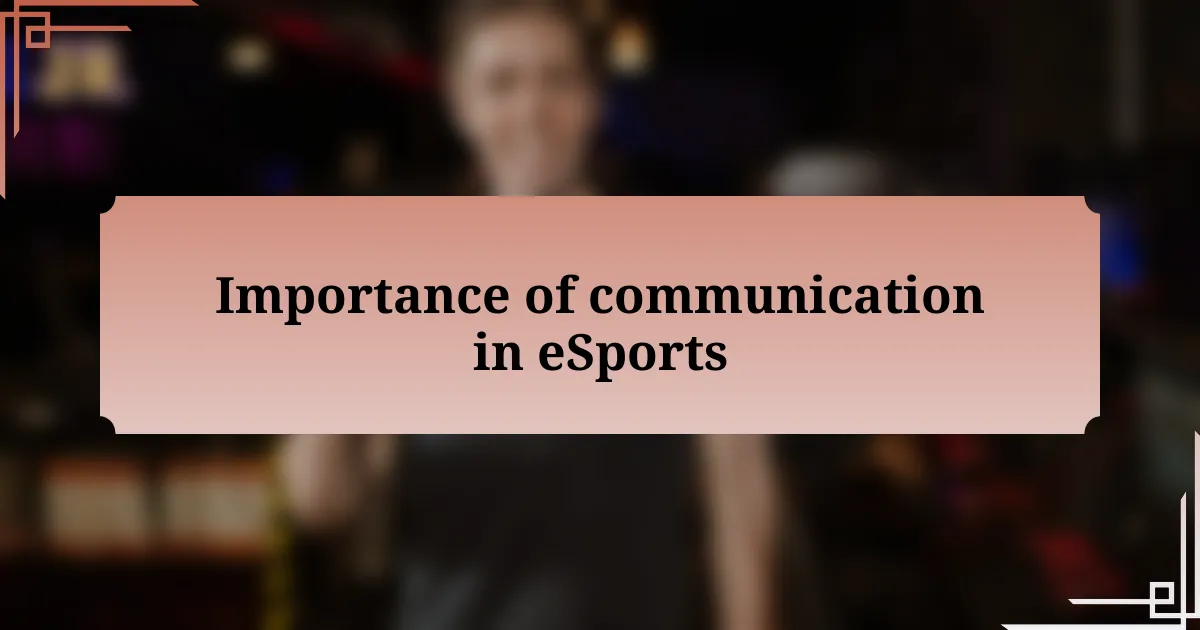
Importance of communication in eSports
Effective communication serves as the backbone of teamwork in eSports. I recall a tournament where our team faced a particularly tough opponent. What made the difference in that high-pressure environment was our ability to call out plays and provide feedback in real time. When everyone is on the same page, it transforms the gameplay; it feels like we were dancing rather than just playing.
It’s fascinating how words can shape outcome! In one match, our support player pointed out an enemy’s positioning, leading us to execute a surprise ambush. Without that quick exchange, I have no doubt we would have been caught off guard—communication turned uncertainty into opportunity. Each voice adds value and brings clarity to our decisions.
Moreover, the emotional element of communication can’t be overlooked. When morale dips during a losing streak, a few encouraging words can reignite our focus and determination. How often have you felt a rush of motivation simply because someone believed in you? In these moments, communication is not just about strategy; it’s about fostering trust and resilience within the team, ultimately propelling us toward shared success.
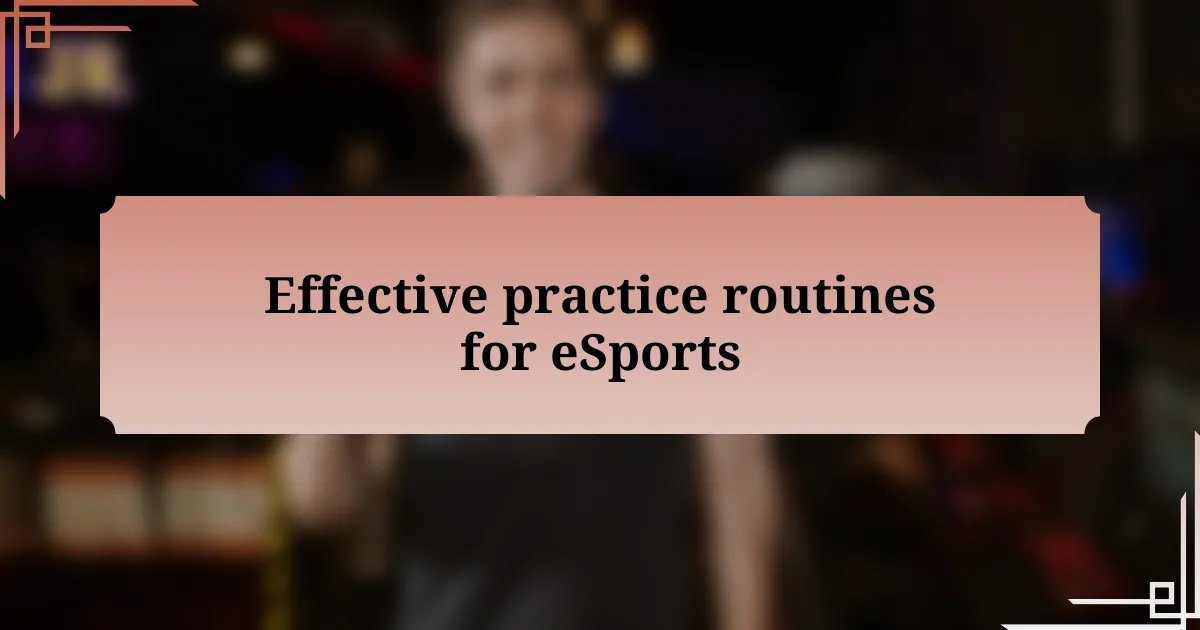
Effective practice routines for eSports
Effective practice routines in eSports build not just skills, but also team synergy. I remember when my team adopted a schedule that included daily scrimmages followed by debriefs. These sessions transformed our individual gameplay into a cohesive strategy, allowing us to identify our strengths and weaknesses while fostering a sense of accountability. It’s fascinating how, by simply structuring our practice, we developed a rhythm that made us more effective during competitions.
In my experience, incorporating specific drills into our practice routine has yielded remarkable results. For instance, we set aside time to work on our communication skills alone, focusing purely on callouts and team positioning without the distraction of gameplay. It might sound basic, but I found that this deliberate practice made an exceptional difference during critical moments in matches. What if we dedicated time to perfect just one aspect of our game every week? The progressive improvement could be astounding!
Another key element I’ve discovered is the importance of reflecting after each practice session. It’s easy to go through the motions and forget to analyze what we’ve learned. I usually jot down notes immediately after scrimmages, detailing what strategies worked and what didn’t. Have you ever noticed how even small adjustments can lead to significant gains in performance? This habit has helped my team actively adapt and grow, turning every practice into an opportunity for improvement.
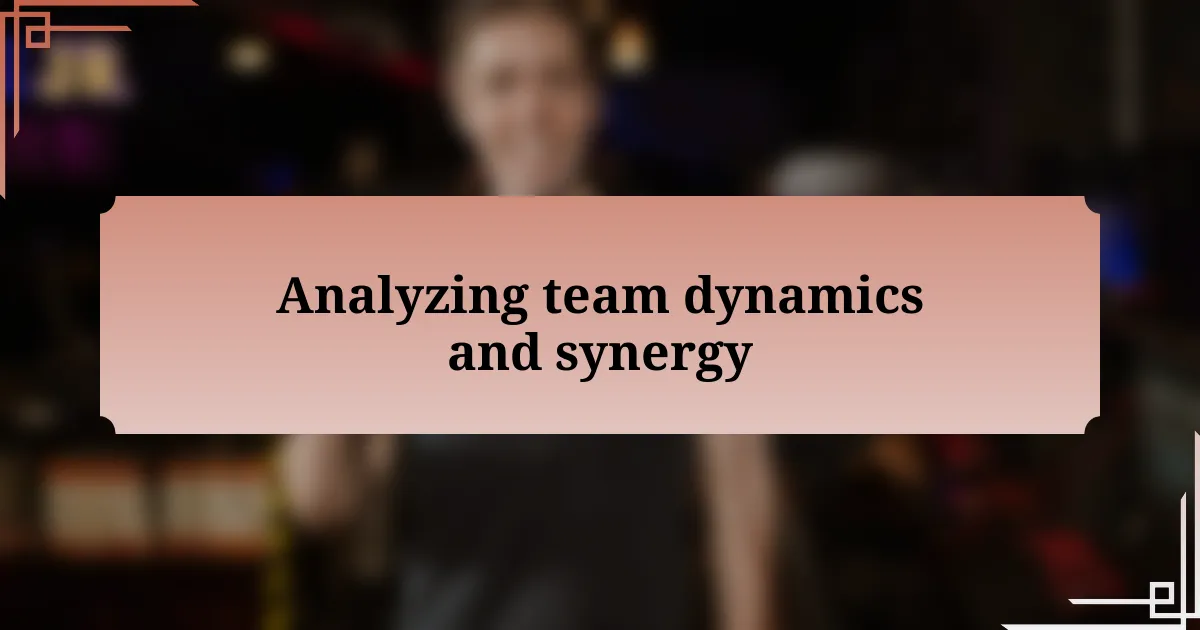
Analyzing team dynamics and synergy
Analyzing team dynamics and synergy is essential in eSports, as it can make or break a team’s performance. In my journey, I’ve noticed that understanding each player’s personality and playing style heavily influences our collective strategy. For instance, when I played with a more introverted member, we learned to bring them into discussions, ensuring their perspectives were valued. This not only improved our synergy but also built trust within the team.
As we delved deeper into team dynamics, I realized that open communication was the cornerstone of our success. I’ll never forget a moment when we had a heated disagreement during a crucial match. It was uncomfortable, but we took a timeout to talk things out. By addressing our issues head-on, we not only salvaged the match but also strengthened our bond. Have you ever experienced a conflict with teammates? It’s enlightening how such moments can lead to a better understanding of each other if approached with respect.
Synergy, in my opinion, is about recognizing and leveraging individual strengths to create a balanced gameplay strategy. I recall one practice where we conducted a role-reversal exercise, allowing players to step into each other’s shoes. This opened my eyes to the challenges others faced and fostered empathy within the group. Simply put, when everyone understands their teammates’ strengths and struggles, it elevates the entire team’s performance. Doesn’t it feel amazing when you can tap into that shared understanding?
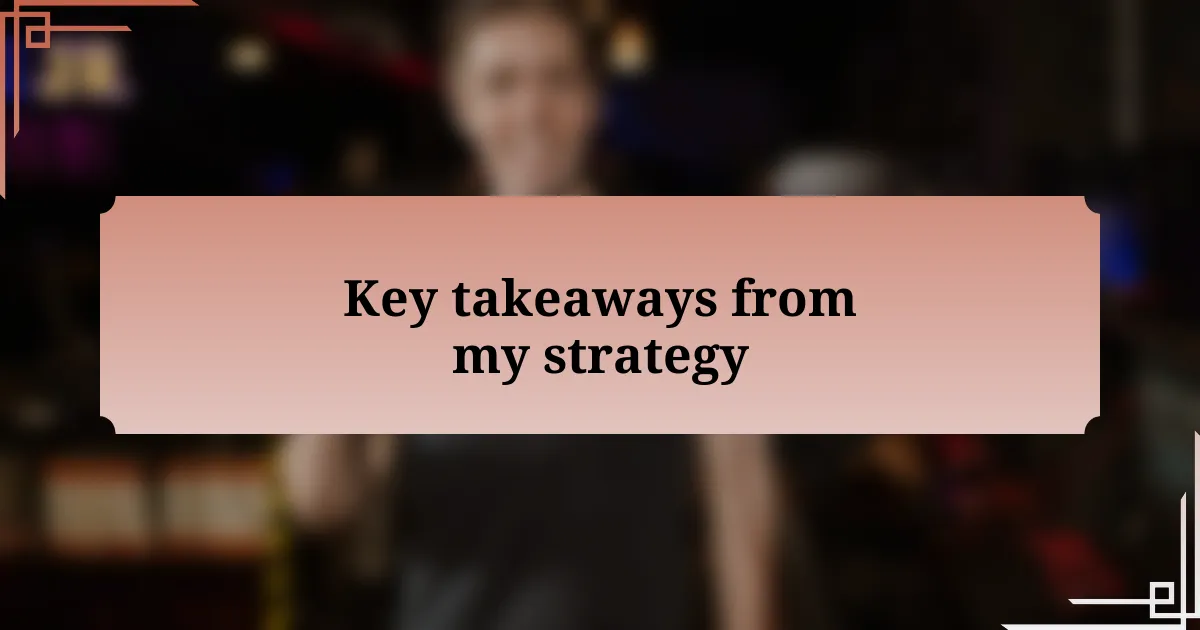
Key takeaways from my strategy
Building strong relationships within the team has been a game-changer for our strategy. I vividly remember a time when we decided to have casual team-building sessions outside of our regular practice. Sharing meals and engaging in light-hearted activities helped break down barriers and allowed us to see each other as individuals rather than just teammates. Have you ever seen how laughter can transform a group dynamic? In my experience, it fosters a sense of belonging, which directly impacts our in-game performance.
Another key takeaway for me has been the importance of adaptability. I learned this lesson during a tournament where our original strategy fell flat against an unexpected playstyle from our opponents. Instead of panicking, we quickly shifted our approach mid-game based on our analysis of the situation—each player contributing their insights. That moment taught me that flexibility can lead to unexpected victories. How often have you found yourself in a situation where adapting made all the difference?
Lastly, I’ve come to appreciate the value of constructive feedback. There was a period where our team struggled with consistency, and I took the initiative to implement regular debriefs after matches. During these sessions, we openly discussed what worked and what didn’t—emphasizing growth rather than assigning blame. This approach not only improved our gameplay but also enriched our camaraderie. When was the last time you received feedback that sparked your improvement? Creating a culture where feedback is a tool for growth rather than criticism has been invaluable in refining our strategy.

